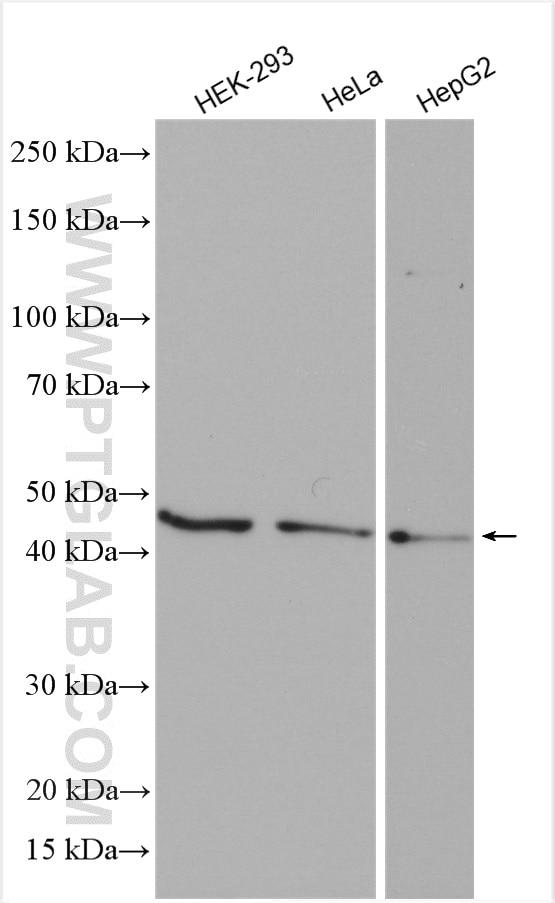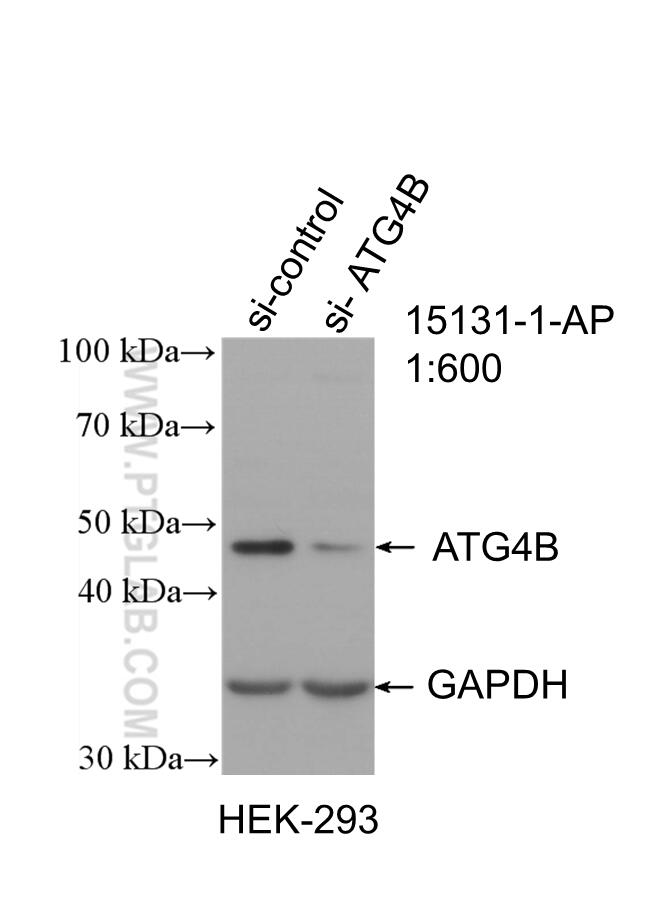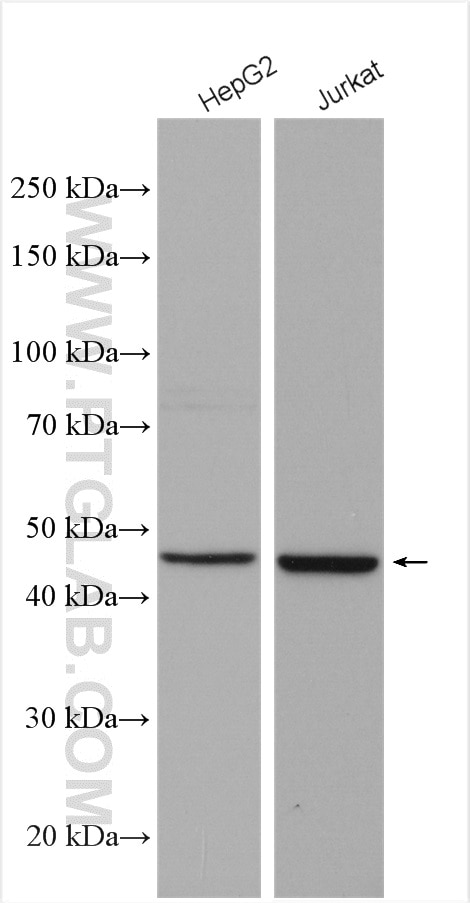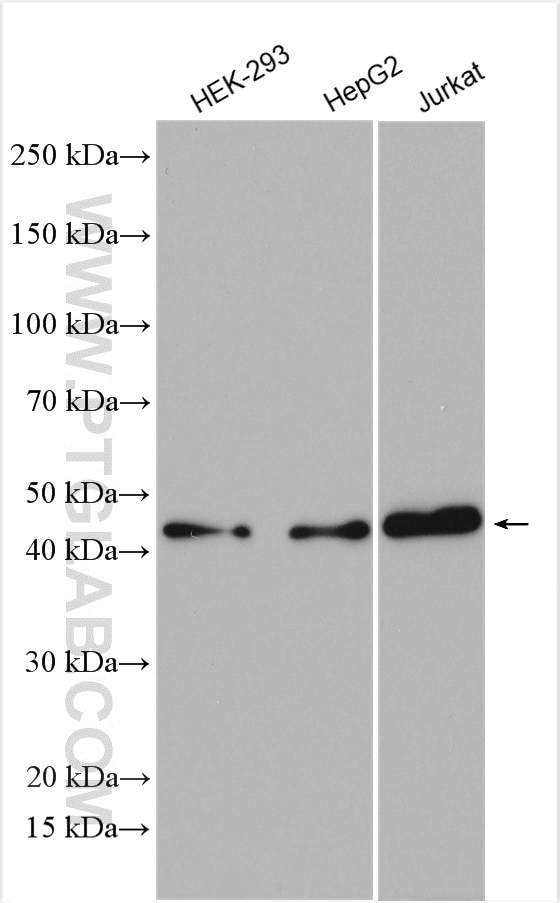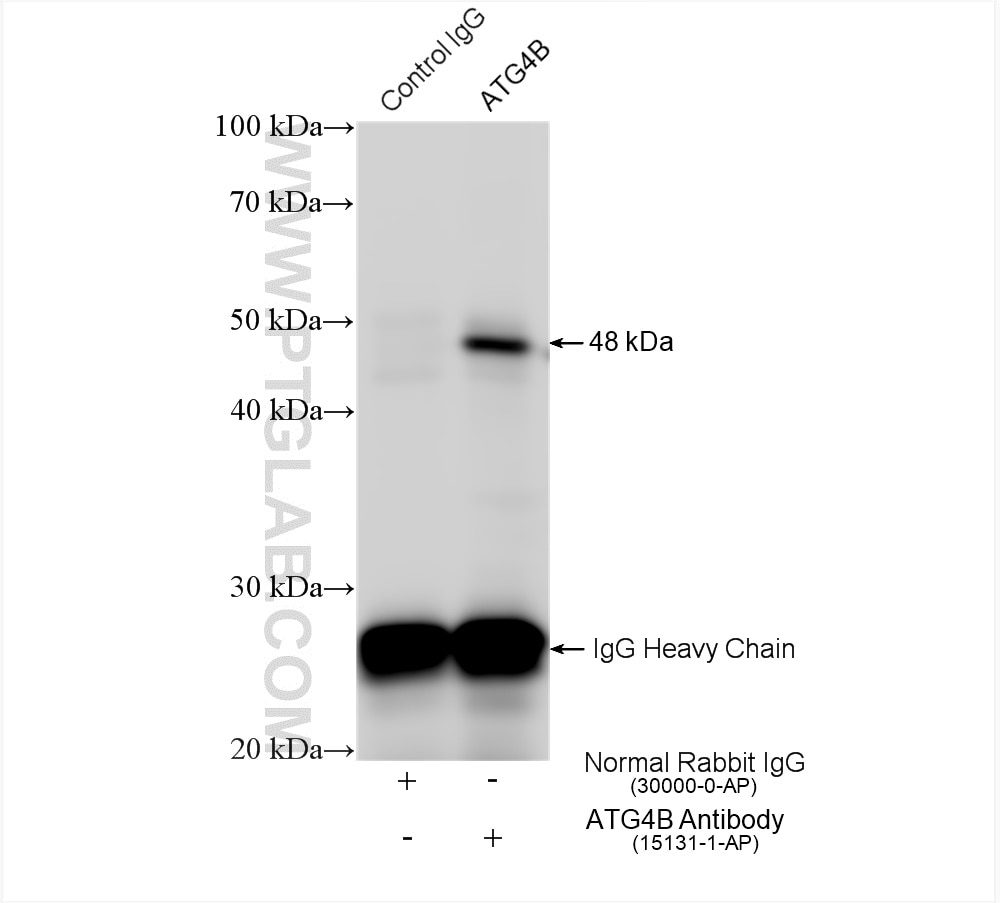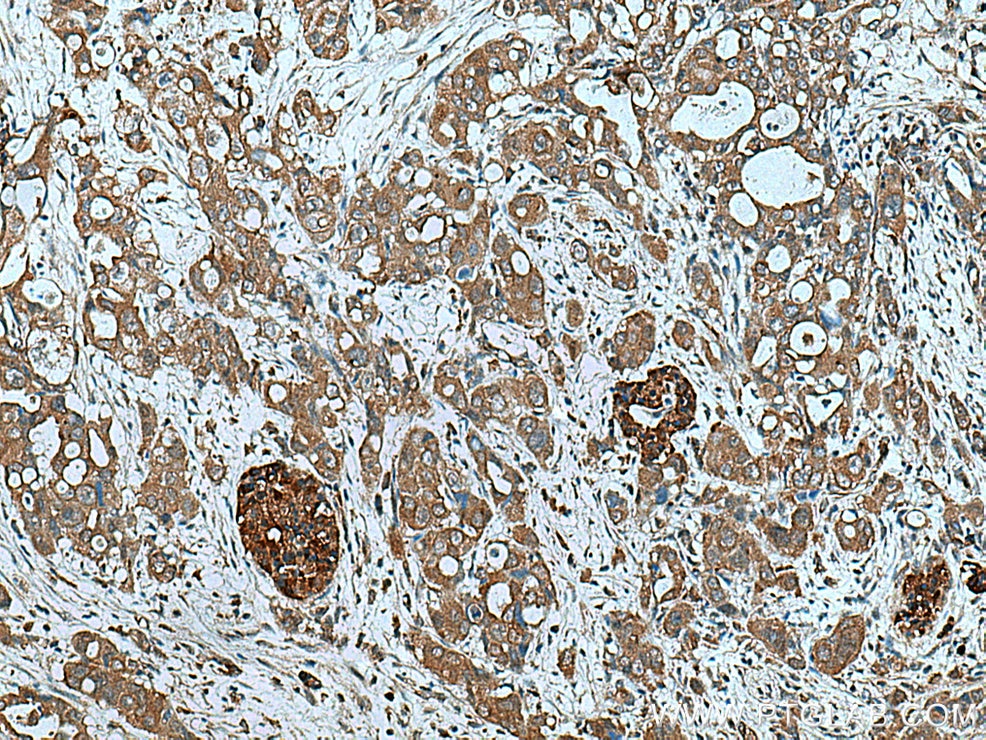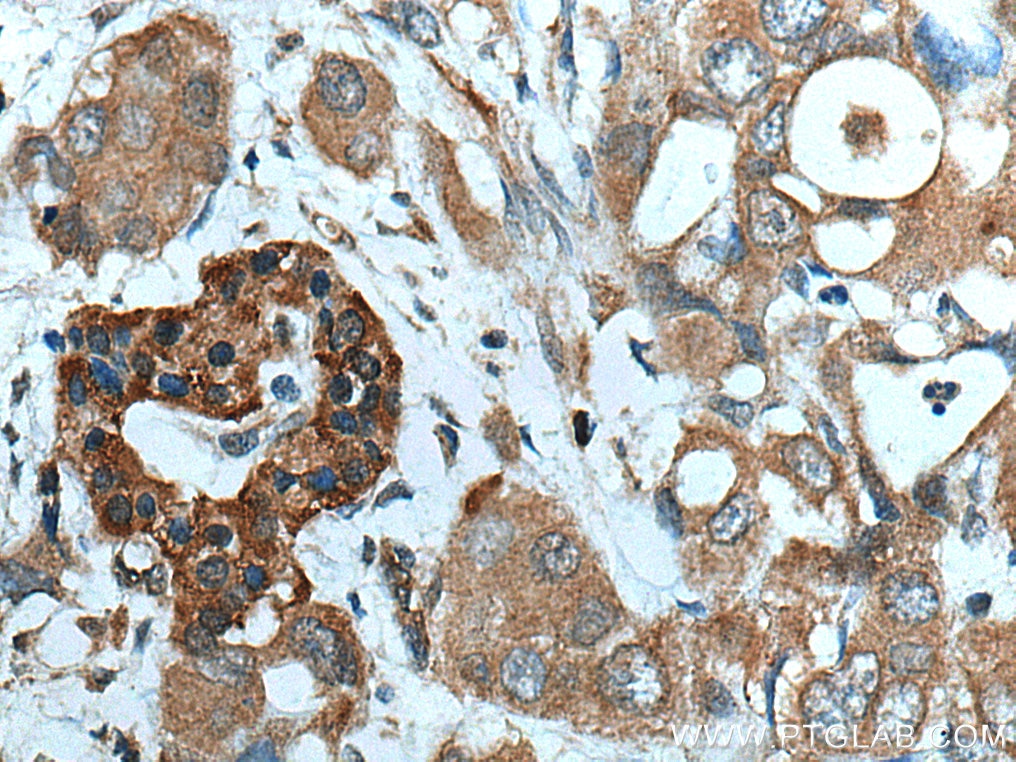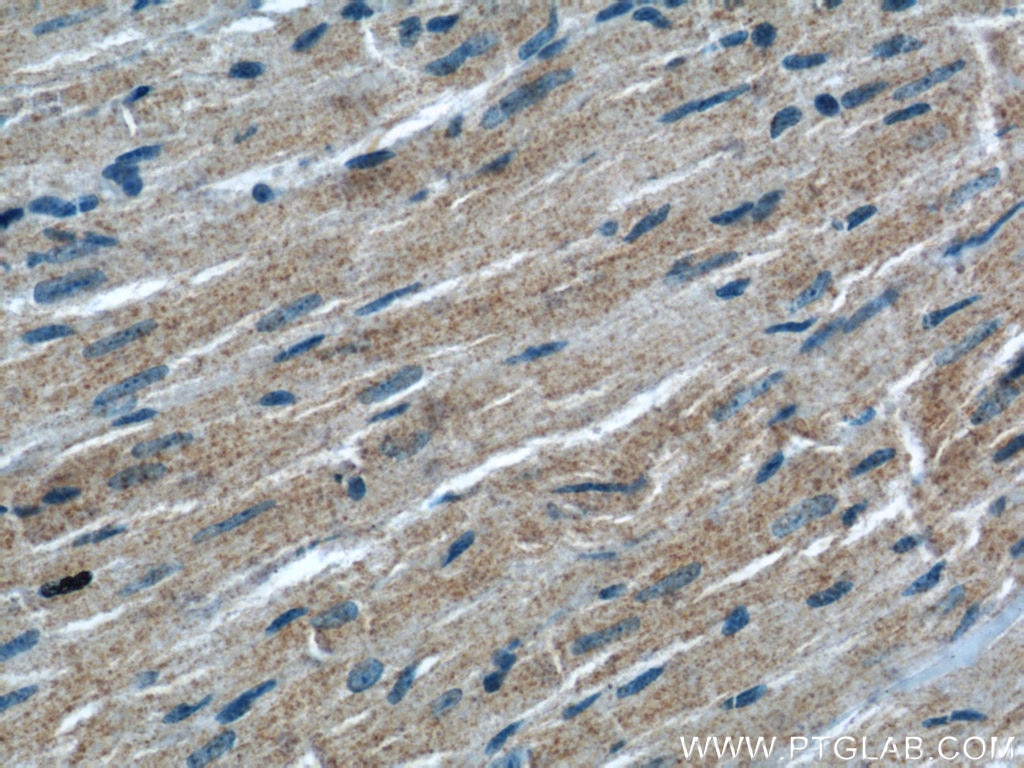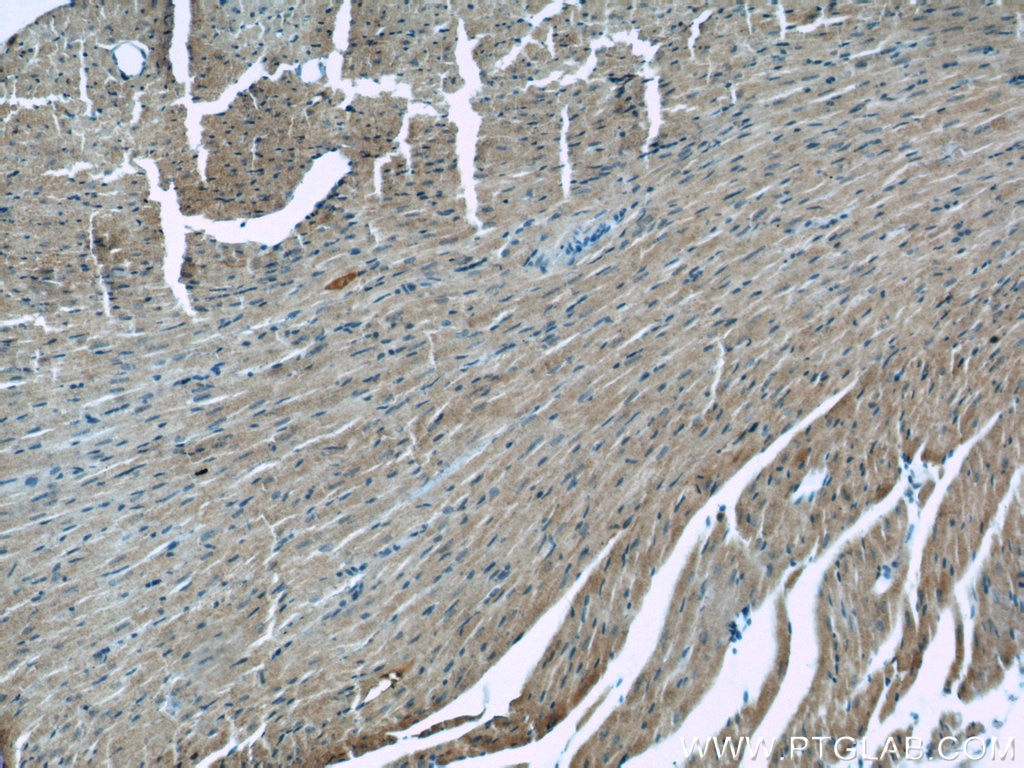- Featured Product
- KD/KO Validated
ATG4B Polyklonaler Antikörper
ATG4B Polyklonal Antikörper für IHC, IP, WB, ELISA
Wirt / Isotyp
Kaninchen / IgG
Getestete Reaktivität
human, Maus, Ratte
Anwendung
WB, IP, IHC, IF, CoIP, ELISA
Konjugation
Unkonjugiert
Kat-Nr. : 15131-1-AP
Synonyme
Galerie der Validierungsdaten
Geprüfte Anwendungen
| Erfolgreiche Detektion in WB | HEK-293-Zellen, HeLa-Zellen, HepG2-Zellen, Jurkat-Zellen |
| Erfolgreiche IP | HeLa-Zellen |
| Erfolgreiche Detektion in IHC | humanes Pankreaskarzinomgewebe, Mausherzgewebe Hinweis: Antigendemaskierung mit TE-Puffer pH 9,0 empfohlen. (*) Wahlweise kann die Antigendemaskierung auch mit Citratpuffer pH 6,0 erfolgen. |
Empfohlene Verdünnung
| Anwendung | Verdünnung |
|---|---|
| Western Blot (WB) | WB : 1:500-1:3000 |
| Immunpräzipitation (IP) | IP : 0.5-4.0 ug for 1.0-3.0 mg of total protein lysate |
| Immunhistochemie (IHC) | IHC : 1:50-1:500 |
| It is recommended that this reagent should be titrated in each testing system to obtain optimal results. | |
| Sample-dependent, check data in validation data gallery | |
Veröffentlichte Anwendungen
| KD/KO | See 5 publications below |
| WB | See 19 publications below |
| IHC | See 3 publications below |
| IF | See 2 publications below |
| IP | See 2 publications below |
| CoIP | See 1 publications below |
Produktinformation
15131-1-AP bindet in WB, IP, IHC, IF, CoIP, ELISA ATG4B und zeigt Reaktivität mit human, Maus, Ratten
| Getestete Reaktivität | human, Maus, Ratte |
| In Publikationen genannte Reaktivität | human, Maus, Ratte |
| Wirt / Isotyp | Kaninchen / IgG |
| Klonalität | Polyklonal |
| Typ | Antikörper |
| Immunogen | ATG4B fusion protein Ag7261 |
| Vollständiger Name | ATG4 autophagy related 4 homolog B (S. cerevisiae) |
| Berechnetes Molekulargewicht | 44 kDa |
| Beobachtetes Molekulargewicht | 44 kDa |
| GenBank-Zugangsnummer | BC000719 |
| Gene symbol | ATG4B |
| Gene ID (NCBI) | 23192 |
| Konjugation | Unkonjugiert |
| Form | Liquid |
| Reinigungsmethode | Antigen-Affinitätsreinigung |
| Lagerungspuffer | PBS mit 0.02% Natriumazid und 50% Glycerin pH 7.3. |
| Lagerungsbedingungen | Bei -20°C lagern. Nach dem Versand ein Jahr lang stabil Aliquotieren ist bei -20oC Lagerung nicht notwendig. 20ul Größen enthalten 0,1% BSA. |
Hintergrundinformationen
ATG4B(autophagy 4) is also named as APG4B, AUTL1, KIAA0943 and belongs to the peptidase C54 family. It is a homolog of yeast Apg4, a cysteine protease involved in autophagy and is a cytoplasmic enzyme. This protein is highly expressed in skeletal muscle, with lower expression in heart, liver, and pancreas and no expression is detected in fetal tissues by the northern blot. ATG4B is widely expressed in tumor cell lines (PMID:12446702). It has some isoforms produced by alternative splicing with molecular mass of 31-52 kDa.
Protokolle
| Produktspezifische Protokolle | |
|---|---|
| WB protocol for ATG4B antibody 15131-1-AP | Protokoll herunterladen |
| IHC protocol for ATG4B antibody 15131-1-AP | Protokoll herunterladen |
| IP protocol for ATG4B antibody 15131-1-AP | Protokoll herunterladen |
| Standard-Protokolle | |
|---|---|
| Klicken Sie hier, um unsere Standardprotokolle anzuzeigen |
Publikationen
| Species | Application | Title |
|---|---|---|
Autophagy ATG4B antagonizes antiviral immunity by GABARAP-directed autophagic degradation of TBK1
| ||
Autophagy RUBCN/rubicon and EGFR regulate lysosomal degradative processes in the retinal pigment epithelium (RPE) of the eye. | ||
Free Radic Biol Med The interaction of Atg4B and Bcl-2 plays an important role in Cd-induced crosstalk between apoptosis and autophagy through disassociation of Bcl-2-Beclin1 in A549 cells.
| ||
Cell Biosci Discovery and mechanism studies of a novel ATG4B inhibitor Ebselen by drug repurposing and its anti-colorectal cancer effects in mice
| ||
Cancer Lett HSF1 upregulates ATG4B expression and enhances epirubicin-induced protective autophagy in hepatocellular carcinoma cells. | ||
Front Cell Dev Biol LncRNA CRNDE Promotes ATG4B-Mediated Autophagy and Alleviates the Sensitivity of Sorafenib in Hepatocellular Carcinoma Cells.
|
